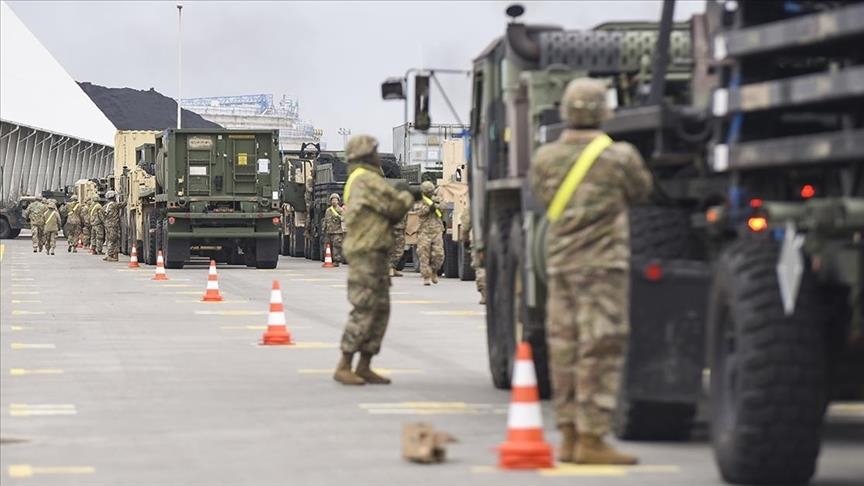– Failure to prevent or mitigate their business relationships with these arms manufacturers transferring arms to Israel could move from being directly linked to human rights abuses to contributing to them
– ‘Today, children in Gaza are the largest group of amputee children in the world due to grave injuries sustained in the war,’ say UN experts
GENEVA
The transfer of weapons and ammunition to Israel may constitute serious violations of human rights and international humanitarian law, as well as state complicity in international crimes, possibly including genocide, UN experts said on Thursday.
In a statement released in Geneva, UN experts reiterated their call for an immediate halt to transfers of weapons and ammunition to Israel.
“In line with recent calls from the Human Rights Council and the independent UN experts to States to cease the sale, transfer, and diversion of arms, munitions, and other military equipment to Israel, arms manufacturers supplying Israel,” said the experts.
The companies include BAE Systems, Boeing, Caterpillar, General Dynamics, Lockheed Martin, Northrop Grumman, Oshkosh, Rheinmetall AG, Rolls-Royce Power Systems, RTX, and ThyssenKrupp, they said, stressing the firms also to end transfers of weapons and ammunition, even if they are done under existing export licenses.
“These companies, by sending weapons, parts, components, and ammunition to Israeli forces, risk being complicit in serious violations of international human rights and international humanitarian laws,” the experts said.
They said the risk is heightened by the recent decision from the International Court of Justice (ICJ) ordering Israel to immediately halt its military offensive in Rafah, after having recognized genocide as a plausible risk.
They noted the request filed by the ICJ prosecutor seeking arrest warrants for Israeli leaders accused of war crimes and crimes against humanity.
“In this context, continuing arms transfers to Israel may be seen as knowingly assisting with operations that contravene international human rights and international humanitarian laws and may result in profit from such assistance,” they said.
An end to transfers must include indirect transfers through intermediary countries that could ultimately be used by Israeli forces, particularly in the ongoing attacks on Gaza.
According to UN experts, arms companies must conduct enhanced human rights due diligence on a systematic and periodic basis to ensure that their products are not used in ways that violate international human rights and humanitarian laws.
Financial institutions
They said financial institutions that invest in these arms companies should also pay attention to the demand.
The experts named investors such as Alfried Krupp von Bohlen und Halbach-Stiftung, Amundi Asset Management, Bank of America, BlackRock, Capital Group, Causeway Capital Management, Citigroup, Fidelity Management & Research, INVESCO Ltd, JP Morgan Chase, Harris Associates, Morgan Stanley, Norges Bank Investment Management, Newport Group, Raven’swing Asset Management, State Farm Mutual Automobile Insurance, State Street Corporation, Union Investment Privatfonds, The Vanguard Group, Wellington and Wells Fargo & Company.
Failure to prevent or mitigate their business relationships with these arms manufacturers transferring arms to Israel could move from being directly linked to human rights abuses to contributing to them, with repercussions for complicity in potential atrocity crimes, experts said.
“Arms initiate, sustain, exacerbate, and prolong armed conflicts, as well as other forms of oppression; hence, the availability of arms is an essential precondition for the commission of war crimes and violations of human rights, including by private armament companies,” they said in the statement.
The UN experts described Israel’s ongoing military assaults as indiscriminate and disproportionate attacks on civilian populations and infrastructure.
These include the extensive use of explosive and incendiary weapons in densely populated areas, as well as in the destruction and damage of essential and life-sustaining civilian infrastructure, including housing and shelters, health, education, water, and sanitation facilities.
“These attacks have resulted in more than 37,000 deaths in Gaza and 84,000 injured. Of these deaths and injuries, an estimated 70% are women and children,” said the experts.
Amputee children
“Today, children in Gaza are the largest group of amputee children in the world due to grave injuries sustained in the war. These operations have also resulted in severe environmental and climate damages.”
The experts said the imperative for an arms embargo on Israel and for investors to take decisive action is more urgent than ever, particularly in light of states’ obligations and companies’ responsibilities.
These fall under the Geneva Conventions, Genocide Convention, international human rights treaties, and UN Guiding Principles on Business and Human Rights.
The experts praised the tireless and sustained efforts of journalists who have documented and reported on the devastating impact of these weapons systems on civilians in Gaza, as well as human rights defenders and lawyers, among other stakeholders, who are dedicated to holding states and companies accountable for the transfer of weapons to Israel.
The experts include Robert McCorquodale (chair), Fernanda Hopenhaym (vice-chair), Pichamon Yeophantong, Damilola Olawuyi and Elzbieta Karska, Working Groups on business and human rights, George Katrougalos, Independent Expert on a democratic and equitable international order, Pedro Arrojo-Agudo, Special Rapporteur on the rights to safe drinking water and sanitation, Reem Alsalem, Special Rapporteur on violence against women and girls, Paula Gaviria Betancur, Special Rapporteur on the rights of internally displaced persons, Tlaleng Mofokeng, Special Rapporteur on the to the enjoyment of the highest attainable standard of physical and mental health, Michael Fakhri, Special Rapporteur on the right to food, and others.
The Special Rapporteurs, Independent Experts, and Working Groups are part of the Special Procedures of the Human Rights Council.

